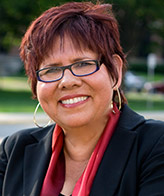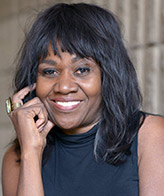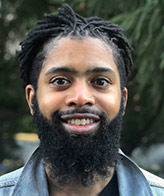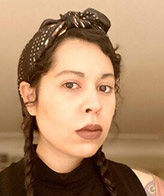Equity Development Institute 2021
Watch Recordings from EDI 2021
Dr. Laura Rendon: Working With Validation, Student Assets & Sentipensante Pedagogy
Dr. Rita Cameron Wedding: Implicit Bias Impact on Decision-Making
May 14, 2021
9 a.m. – 3:30 p.m.
Agenda
9 – 9:30 a.m. | Welcome/Opening Session
9:30 – 11 a.m. | Keynote Speaker Dr. Laura Rendon
Working With Validation, Student Assets & Sentipensante Pedagogy
Rendón will address themes related to fostering student success especially for low-income, first-generation students. Creating a culture of success requires attention to: 1) a relationship-centered approach centering the importance of validating students, 2) the need to leverage student assets, and 3) the importance of working with a high-impact pedagogy, including contemplative, deep learning experiences.
11:15 a.m. – 12:30 p.m. | Workshops
HC Guided Pathways Advising Professional Development Subgroup:
Bob Scribner- Learning and Teaching Center Program Manager, Briana Quintanilla-Program Manager of Faculty Advising, Kathy Nguyen- Program Manager and Academic Advisor Passport /TRiO, Shelly Page- Accounting Faculty
The Choice is Yours: Aligning Advising with the Student Experience
This training will provide an opportunity for staff/faculty to step into the shoes of students and identify points where they can provide warm advising and support, in the midst of common college challenges. Attendees will: articulate the barriers embedded in higher education systems, identify 1-2 impacts of self- and student-identity on advising and learn strategies for adapting and adjusting their advising philosophy and style, depending on the type of student they are working with, such as how to interact with diverse student populations.
Dr. Laura Rendon
Designing for Wholeness, Equity & Justice: Sentipensante Pedagogy
The design issue is: What kind of learning context is best suited for deeply engaging the whole student and for connecting pedagogy to justice and equity? Rendón will review the basic tenets of operating with Sentipensante (Sensing/Thinking) Pedagogy to address the rhythmic balance between intellectual, social, emotional and inner-life skill development. Rendón will feature videos of faculty who foster deep learning employing illuminative knowledge tools (i.e., socially-driven art and photography, guided imagery, audio narratives, music and periods of reflection).
Rashid Hughes
The Practice of R.E.S.T. – Mindfulness for Individual & Social Transformation
During this workshop, participants will explore how mindfulness can function as a restorative practice that provides individual and social healing from the capitalistic structures of production and self-striving. The practice of R.E.S.T. is an invitation for all people to rediscover belonging and awareness in “just being.” In this practice, our natural state of restfulness is our starting and finishing point. As such, participants will explore mindfulness without the burden of needing to “calm down” or “manage their emotions”—phrases that are often reflective of the language used by white racist culture to silence the voices of BIPOC who openly name and speak out against injustice, hate, and violence.
Brooke Stepp
Feeling Into Being: A Somatic Understanding of Trauma and Oppression
Organizer and politicized healer, Prentis Hemphill talks about oppression being the unequal organization of trauma in our society. In this highly experiential workshop, participants will feel into the way that our bodies hold the memories of that oppression and how it comes to live in us as trauma over time. We will connect this shaping to how it is that we move from the place of our values under the pressures of the world around us. Participants will leave with a new understanding of how their bodies not only hold the experiences of trauma and oppression, but also the potential for liberation.
12:30 – 1:00 p.m. | Lunch
1 – 2:45 p.m. | Dr. Rita Cameron Wedding- w/ activity
Implicit Bias Impact on Decision-Making
Implicit Bias Impact on Decision-Making uses an anti-racist focus to identify strategies and interventions to mitigate the impact of systemic racism. This keynote will address how bias can inform individual and institutional patterns of discrimination.
Focusing on five factors of systemic racism, e.g., implicit bias, stereotypes, color blindness, microaggressions and language the training will explore how biases can influence personal decision-making and institutional outcomes at any decision point, e.g., classroom, campus life, student advising, hiring, professional development etc.
This training will explore how disparities in other public systems such as criminal justice, child welfare, mental health and K-12 education, contribute to outcomes in higher education. This training will discuss the impact of implicit bias on student and faculty success.
This training will also address how the external environment such as the pandemic, protests, and social justice issues have the potential to reshape the higher education landscape.
Part II: In addition to the keynote presentation, a workshop will allow participants to utilize a Racial Impact Assessment tool to identify and assess disparities in policies and practices and their effects on educational services at key decision points within the college. This activity will allow participants to explore the effects of bias on issues such as:
- How implicit bias can have an impact on classroom participation, student advising, campus climate, faculty hiring etc.
- How racially coded language can affect student or faculty evaluations.
- How bias at one decision-point contributes to bias at subsequent decision-points
2:45 – 3 p.m. | Break
3 – 3:30 p.m. | Debrief
Speakers

Dr. Laura Rendón
Laura Rendón is nationally recognized as an education theorist, activist and researcher who specializes in college preparation, persistence and graduation of low-income, first-generation students.
A native of Laredo, Texas, Rendón’s passion is assisting students who, like her, grew up in poverty with hopes and dreams but not knowing how to realize them. Rendón is credited with developing the theory of validation, which colleges and researchers have employed as a framework for working with and affirming low-income students.
Rendón is a teaching and learning philosopher and thought leader. She developed a pedagogic framework called Sentipensante (Sensing/Thinking) Pedagogy that emphasizes intellectual, social, emotional and spiritual student development along with social activism.
Rendón is an active scholar whose research has been published in key education research journals. She is also the author of Sentipensante (Sensing/Thinking) Pedagogy: Educating for Wholeness, Social Justice and Liberation. Moreover, she is co-editor of books and monographs including: Transforming the First Year of College for Students of Color; Educating a New Majority; Introduction to American Higher Education; and Racial and Ethnic Diversity in Higher Education ASHE Reader.
She is co-director of the Center for Research and Policy in Education in the College of Education and Human Development at the University of Texas in San Antonio, which engages in research that informs the education community about critical factors that affect the academic success of key student groups.
She is also one of the founders and former Board Chair of the National Council for Community and Education Partnerships (Washington, DC) focused on providing access to college for low-income students. She has served on the Board of Trustees for Naropa University in Boulder, Colorado. Further, Rendón has designed and coordinated the yearly Latino/a Student Success Institute for the American Association of Hispanics in Higher Education, the nation’s premier scholarly organization focusing on higher education issues impacting Latinos.
As a leader in the field of college access and achievement, Rendón’s research has been featured in the Chronicle of Higher Education and the PBS documentary, “The College Track.” Rendón is a frequent speaker at colleges and universities throughout the nation on topics related to improving persistence and completion. Learn More.

Rita Cameron Wedding, Ph.D.
Rita Cameron Wedding, Ph.D. was the Women’s Studies Department Chair at Sacramento State University for 23 years and is currently teaching in the departments of Women’s and Ethnic Studies at Sacramento State University. Dr. Cameron Wedding’s curriculum Implicit Bias: Impact on Decision-Making, has been used to train judges, public defenders, practitioners in child welfare, juvenile justice, law enforcement and education throughout the country since 2005. As a faculty for the National Council of Juvenile and Family Court Judges (NCJFCJ), she has trained judges at court improvement initiatives in over 40 states. In 2010 Dr. Cameron
Wedding was featured in the Office of Juvenile Justice and Delinquency Prevention’s (OJJDP) website which showcased her work for “content, expertise and platform excellence.” She was also a consultant for the Annie E. Casey Foundation, one of the largest child advocacy foundations in the U.S. In 2013 in response to the U.S. Department of Justice’s 3-year investigation and findings of civil rights violations, Dr. Cameron Wedding led a training team of 5 experts to provide implicit bias training to the entire Shelby County Juvenile Court. In California 2009-11, she directed an implicit bias training program designed to mitigate the effects of the School to Prison Pipeline by identifying practices that contribute to negative
In 2015, Dr. Cameron Wedding provided expert testimony to President Obama’s Commission on Child Abuse and Neglect Fatalities. Dr. Cameron Wedding has conducted implicit bias Train the Trainer Institutes, webinars, keynotes and curriculum development in numerous agencies and states throughout the country including the Texas New Judges College, the National Association of Children’s Counsel, the Family Court of the Superior Court of the District of Columbia, Child Abuse and Neglect Institutes in Reno, Louisville, and Atlanta, the New York State Judicial Institute, Superior Court Judges in Hawaii and Illinois and the Michigan Judges Association. She was the lead presenter on implicit bias for Georgetown University’s Center for Juvenile Justice and Reform Conference in 2017, and as a subject matter expert she developed implicit bias police de-escalation curriculum for Fight Crime Invest in Kids, for their use in training 5000 in-service and academy officers in the U.S. In 2012 Dr. Cameron Wedding was the recipient of the John C. Livingston Distinguished Faculty Lecture Award at Sacramento State University. Currently, Dr. Cameron Wedding writes implicit bias train-the-trainers curriculum and conducts training for a multinational technology company. Recently she wrote one of the first declarations to identify implicit bias in a court proceeding under California’s Racial Justice Act (2020). Dr. Cameron Wedding has been the lead trainer for the Implicit Bias Institute provided by Skagit College Workforce Development.

Rashid Hughes
Rashid Hughes (he/him) is a writer, meditation teacher, yoga instructor and a restorative justice facilitator. He is the co-founder of the Heart Refuge Mindfulness Community, a Mindfulness Community in Washington, DC that is dedicated to inspiring Black, Indigenous, and People of Color to live with love and courage. Rashid is an Affiliate Teacher for the Insight Meditation Community of Washington DC, and he is also a teacher of the Presence Collective. He holds a Master of Divinity Degree from the Howard University School of Divinity and has two recently published articles in Mindful Magazine “R.E.S.T.-A Guided Practice for the Tired & Weary”” and Lions Roar Magazine “When Aggression Masquerades as Compassion.”

Brooke Stepp
Brooke Stepp (they/them) is a mixed race, black and white, nonbinary, queer femme therapist, facilitator, and community organizer who has been working at the intersection of social justice and healing for most of their adult life. In all the work they do, Brooke strives to be a bridge between liberation and healing work, acknowledging that our personal well being is intimately tied to our collective wellbeing. Brooke longs for a world beyond the public/private divide that racialized capitalism creates, imagining a future where our needs being met are tied to our inherent dignity rather than to what we produce. Brooke has trained with generative somatics since 2010 and finds much of their inspiration from this lineage. When Brooke isn’t working, they are dancing in their living room, connecting with their community, hanging out with their 3 perfect and amazing cats, reading communist theory, training muay thai, and going for walks through their neighborhood.

